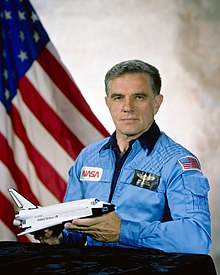Karl Gordon Henize
| Karl G. Henize | |
|---|---|
 |
|
| NASA Astronaut | |
| Nationality | American |
| Born |
17 October 1926 Cincinnati, Ohio, U.S. |
| Died | 5 October 1993 (aged 66) Mount Everest, Nepal |
|
Other names
|
Karl Gordon Henize |
|
Other occupation
|
Astronomer, space scientist |
|
UVA, B.A. 1947, M.A. 1948 UMich, Ph.D. 1954 |
|
|
Time in space
|
7d 22h 45min |
| Selection | 1967 NASA Group 6 |
| Missions | STS-51-F |
|
Mission insignia
|
|
| Retirement | April 1986 |
Karl Gordon Henize[p], Ph.D. (17 October 1926 – 5 October 1993) was an American astronomer, space scientist, NASA astronaut, and professor at Northwestern University. He was stationed at several observatories around the world, including McCormick Observatory, Lamont-Hussey Observatory (South Africa), Mount Wilson Observatory, Smithsonian Astrophysical Observatory and Mount Stromlo Observatory (Australia). He was in the Astronaut Support Crew for Apollo 15 and Skylab 2, 3 and 4. As a Mission Specialist on the Spacelab-2 mission (STS-51-F), he flew on Space Shuttle Challenger in July/August 1985. He was awarded the NASA Exceptional Scientific Achievement Medal in 1974.
He died in 1993, during a Mount Everest expedition. The purpose of this expedition was to test for NASA a meter called a Tissue Equivalent Proportional Counter (TEPC): testing at different altitudes (17,000 ft, 19,000 ft and 21,000 ft) would reveal how people’s bodies would be affected, including the way bodily tissues behaved, when struck by radiation, and this was important for the planning of long duration space missions. Having reached Advanced Base Camp at 21,300 feet (6,500 m), the expedition was cut short when Henize died from high altitude pulmonary edema (HAPE) on October 5, 1993.
...
Wikipedia
